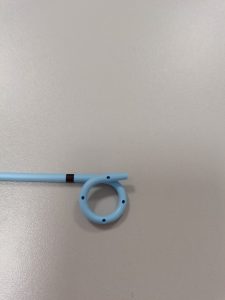A percutaneous nephrostomy (PCN) catheter is a medical device used to drain urine from the kidneys when the normal urinary drainage system is blocked or obstructed. It is inserted through the skin into the kidney and is used to divert urine from the kidney into a collection bag outside the body.
The urinary system consists of the kidneys, ureters, bladder, and urethra. The kidneys filter waste products from the blood and produce urine, which then flows through the ureters into the bladder for storage. When the urinary system is functioning normally, urine flows freely from the kidneys into the bladder and out of the body through the urethra. However, if there is a blockage or obstruction in the urinary system, urine can back up and cause damage to the kidneys.
There are many reasons why a person might need a PCN catheter. Some common indications include:
1.Urinary obstruction: A blockage in the urinary system can occur due to a variety of reasons, including kidney stones, tumors, or scar tissue. If the obstruction is severe enough, urine can back up and damage the kidneys. A PCN catheter can be used to bypass the obstruction and allow urine to drain from the kidney.
2.Infection: In some cases, a urinary tract infection (UTI) can spread to the kidneys and cause an abscess or other complications. A PCN catheter can be used to drain the infected fluid from the kidney and help treat the infection.
3.Surgery: In some cases, a PCN catheter may be placed prior to kidney surgery to drain urine from the kidney and prevent complications.
The procedure for inserting a PCN catheter involves numbing the skin and then inserting a thin, flexible tube through the skin and into the kidney. The procedure is usually done under local anesthesia and may be guided by ultrasound or other imaging techniques. Once the catheter is in place, it is secured to the skin and connected to a collection bag.
A PCN catheter is typically left in place for a few days or weeks, depending on the reason for the catheter and the individual’s medical condition. During this time, the patient must be careful to keep the catheter and collection bag clean to prevent infection. The catheter may need to be flushed periodically to ensure that it remains clear and functioning properly.
In some cases, a PCN catheter may be replaced with a ureteral stent, which is a permanent device that helps keep the urinary system open. However, this is typically only done in cases where the obstruction is expected to be long-term or permanent.
In summary, a PCN catheter is a medical device used to drain urine from the kidneys when the normal urinary drainage system is blocked or obstructed. It is a minimally invasive procedure that can help prevent kidney damage and other complications associated with urinary obstruction. If you think you might benefit from a PCN catheter, talk to your doctor about your options and whether this procedure is right for you.



